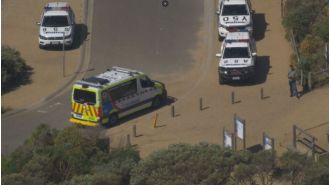Almost 20% of rape cases dismissed as victims endure lengthy wait for trial.
62 prosecutions (20%) were halted from March to May due to complainants retracting their support.
December 5th 2024.

From March to May of this year, there were 62 cases that were not pursued due to the victims withdrawing their support. It's quite alarming to know that one out of every five rape cases is falling through because the victims are choosing to drop out instead of waiting for their case to be heard in court.
The Director of Public Prosecutions, Stephen Parkinson, has acknowledged the connection between victims backing out and the long delays in the criminal justice system. These victims are waiting for up to five years to see their case go to trial, which is an incredibly long and difficult wait. Mr. Parkinson has made it clear that reducing these delays and providing better support for victims are his top priorities.
In order to address the high level of victim attrition, the CPS has launched a program to help keep victims involved in the legal process. Mr. Parkinson has stated that delays have increased throughout the criminal justice system, and they are currently at the worst levels he has ever seen. As a result, victims are choosing to withdraw their support and are not staying with the prosecution. This is why the CPS has launched this program - to try and keep victims engaged and involved.
Mr. Parkinson has also shared that the CPS has significantly increased the number of prosecutions being brought forward for rape and serious sexual offenses since 2020. Additionally, there has been a notable improvement in the charge rate, which has risen from 59% to 75% in the first quarter of this financial year. However, despite these positive changes, there were still 62 cases where the victim withdrew support in the latest period, which is a five-fold increase from the previous year's quarterly average.
To help combat this trend, new measures have been put in place to support victims of rape and serious sexual offenses. These measures include offering pre-trial meetings with prosecutors and providing dedicated victim liaison officers who will serve as a single point of contact for victims. These officers will be able to answer any questions the victims may have about their case and provide support as the legal process progresses.
Research conducted three years ago showed that victims had a lack of understanding about the role of prosecutors and desired better communication and cohesion within the justice system. The CPS has taken this feedback into account and is working on improving how prosecutors communicate with victims. For example, instead of stating the suspect's name in the very first line of letters sent to complainants, the CPS has changed the format to be more considerate and less distressing for victims. Additionally, a trial is currently taking place to increase the level of communication with victims, where they will be contacted when a decision to charge is made and have the opportunity to ask any questions they may have.
Furthermore, the CPS has hired 40 victim liaison officers across the country to act as a single point of contact for victims of rape and serious sexual offenses. These officers will be available for victims from the moment a charging decision is made and can offer support and arrange pre-trial meetings with prosecutors. Charlotte Caulton-Scott, Head of a Rape and Serious Sexual Offenses unit in CPS East Midlands, has described these officers as an "absolutely incredible addition" to the CPS. She shared an example of a domestic abuse case where the victim was struggling and had her trial date pushed back four times. However, after being offered additional support and being invited to meetings, the victim stuck with the legal process and her abuser recently pleaded guilty in court.
It's evident that these measures are vital in supporting victims of rape and serious sexual offenses. Ms. Caulton-Scott emphasized the significant impact these measures can have, especially for victims who have already been through so much trauma. She shared that victims often have to relive their trauma multiple times over the course of several years, and this is incredibly challenging for them. The CPS is committed to improving the system and ensuring that victims have the support and resources they need to see their case through to the end.
On average, it takes 393 days for rape cases to progress from the point of charge to conclusion. When you add in the 317 days between the complaint and the charging decision, victims are facing a long and difficult wait of around 700 days. Mr. Parkinson has stated that this project is still in its early days, but so far, 550 people have been offered meetings, with 28 already taking place, mostly online. Victims have the choice of where these meetings take place and whether they are in person or online. Additionally, 550 staff members have been trained in having sensitive conversations and addressing myths and misconceptions surrounding consent.
Mr. Parkinson has acknowledged that this is just the beginning, and the CPS will be evaluating the effectiveness of these measures. He is confident that they will improve the confidence of victims and reduce victim attrition. The CPS will also gather feedback from victims to ensure that their needs are being met and that the legal process is as smooth and supportive as possible. Ultimately, the goal is to improve confidence and reduce victim attrition, and the CPS is committed to making this a reality.
The Director of Public Prosecutions, Stephen Parkinson, has acknowledged the connection between victims backing out and the long delays in the criminal justice system. These victims are waiting for up to five years to see their case go to trial, which is an incredibly long and difficult wait. Mr. Parkinson has made it clear that reducing these delays and providing better support for victims are his top priorities.
In order to address the high level of victim attrition, the CPS has launched a program to help keep victims involved in the legal process. Mr. Parkinson has stated that delays have increased throughout the criminal justice system, and they are currently at the worst levels he has ever seen. As a result, victims are choosing to withdraw their support and are not staying with the prosecution. This is why the CPS has launched this program - to try and keep victims engaged and involved.
Mr. Parkinson has also shared that the CPS has significantly increased the number of prosecutions being brought forward for rape and serious sexual offenses since 2020. Additionally, there has been a notable improvement in the charge rate, which has risen from 59% to 75% in the first quarter of this financial year. However, despite these positive changes, there were still 62 cases where the victim withdrew support in the latest period, which is a five-fold increase from the previous year's quarterly average.
To help combat this trend, new measures have been put in place to support victims of rape and serious sexual offenses. These measures include offering pre-trial meetings with prosecutors and providing dedicated victim liaison officers who will serve as a single point of contact for victims. These officers will be able to answer any questions the victims may have about their case and provide support as the legal process progresses.
Research conducted three years ago showed that victims had a lack of understanding about the role of prosecutors and desired better communication and cohesion within the justice system. The CPS has taken this feedback into account and is working on improving how prosecutors communicate with victims. For example, instead of stating the suspect's name in the very first line of letters sent to complainants, the CPS has changed the format to be more considerate and less distressing for victims. Additionally, a trial is currently taking place to increase the level of communication with victims, where they will be contacted when a decision to charge is made and have the opportunity to ask any questions they may have.
Furthermore, the CPS has hired 40 victim liaison officers across the country to act as a single point of contact for victims of rape and serious sexual offenses. These officers will be available for victims from the moment a charging decision is made and can offer support and arrange pre-trial meetings with prosecutors. Charlotte Caulton-Scott, Head of a Rape and Serious Sexual Offenses unit in CPS East Midlands, has described these officers as an "absolutely incredible addition" to the CPS. She shared an example of a domestic abuse case where the victim was struggling and had her trial date pushed back four times. However, after being offered additional support and being invited to meetings, the victim stuck with the legal process and her abuser recently pleaded guilty in court.
It's evident that these measures are vital in supporting victims of rape and serious sexual offenses. Ms. Caulton-Scott emphasized the significant impact these measures can have, especially for victims who have already been through so much trauma. She shared that victims often have to relive their trauma multiple times over the course of several years, and this is incredibly challenging for them. The CPS is committed to improving the system and ensuring that victims have the support and resources they need to see their case through to the end.
On average, it takes 393 days for rape cases to progress from the point of charge to conclusion. When you add in the 317 days between the complaint and the charging decision, victims are facing a long and difficult wait of around 700 days. Mr. Parkinson has stated that this project is still in its early days, but so far, 550 people have been offered meetings, with 28 already taking place, mostly online. Victims have the choice of where these meetings take place and whether they are in person or online. Additionally, 550 staff members have been trained in having sensitive conversations and addressing myths and misconceptions surrounding consent.
Mr. Parkinson has acknowledged that this is just the beginning, and the CPS will be evaluating the effectiveness of these measures. He is confident that they will improve the confidence of victims and reduce victim attrition. The CPS will also gather feedback from victims to ensure that their needs are being met and that the legal process is as smooth and supportive as possible. Ultimately, the goal is to improve confidence and reduce victim attrition, and the CPS is committed to making this a reality.
[This article has been trending online recently and has been generated with AI. Your feed is customized.]
[Generative AI is experimental.]
0
0
Submit Comment





